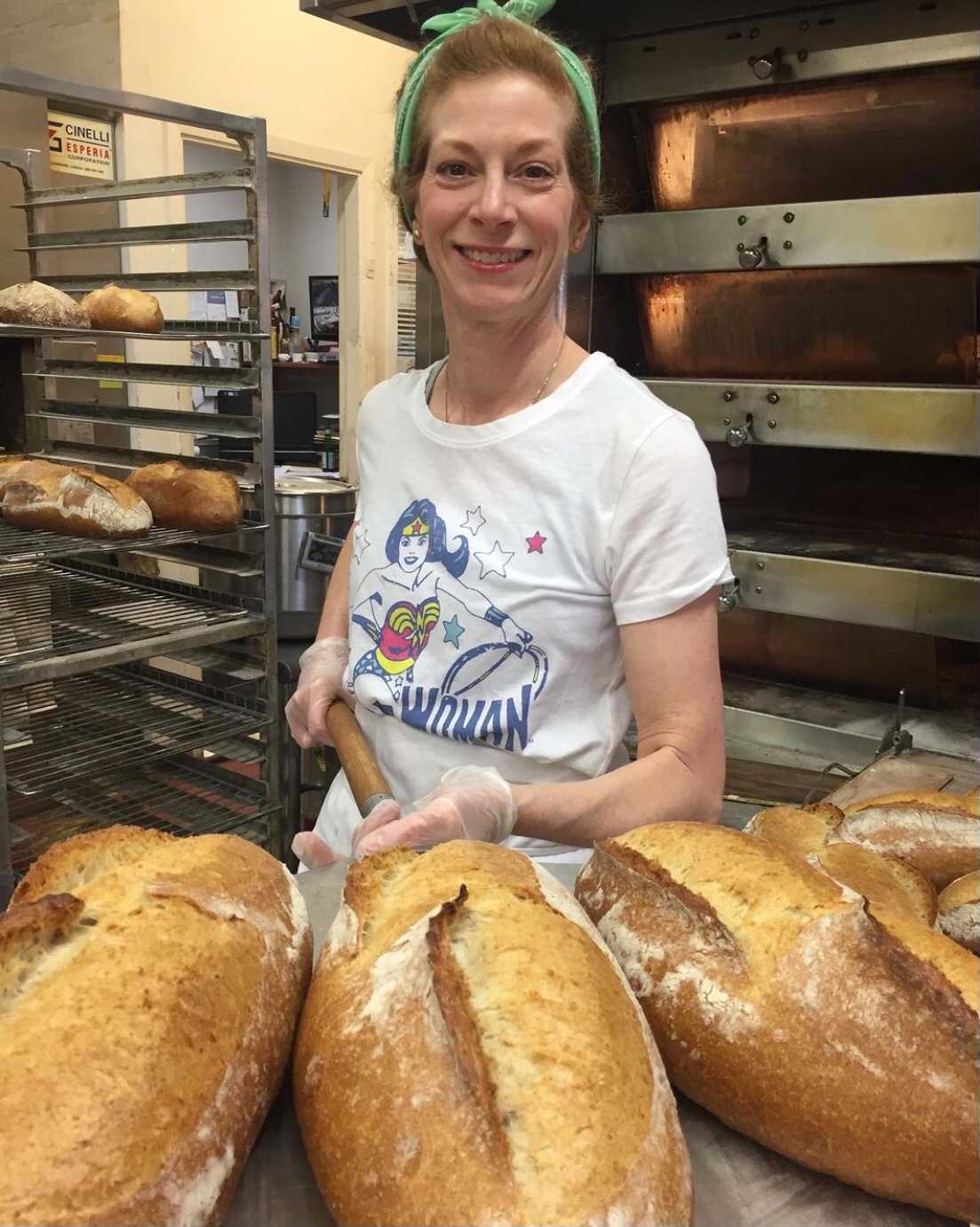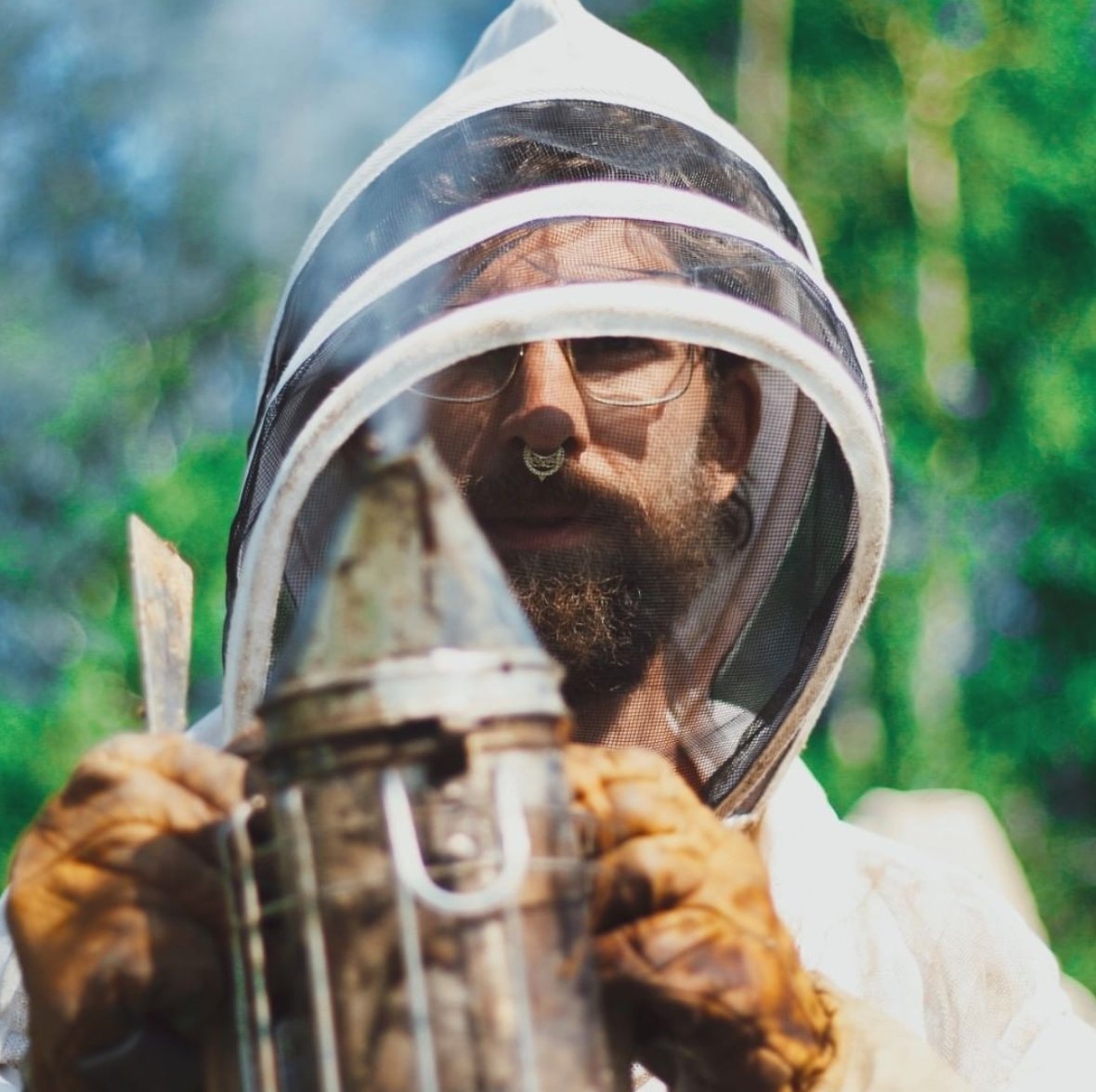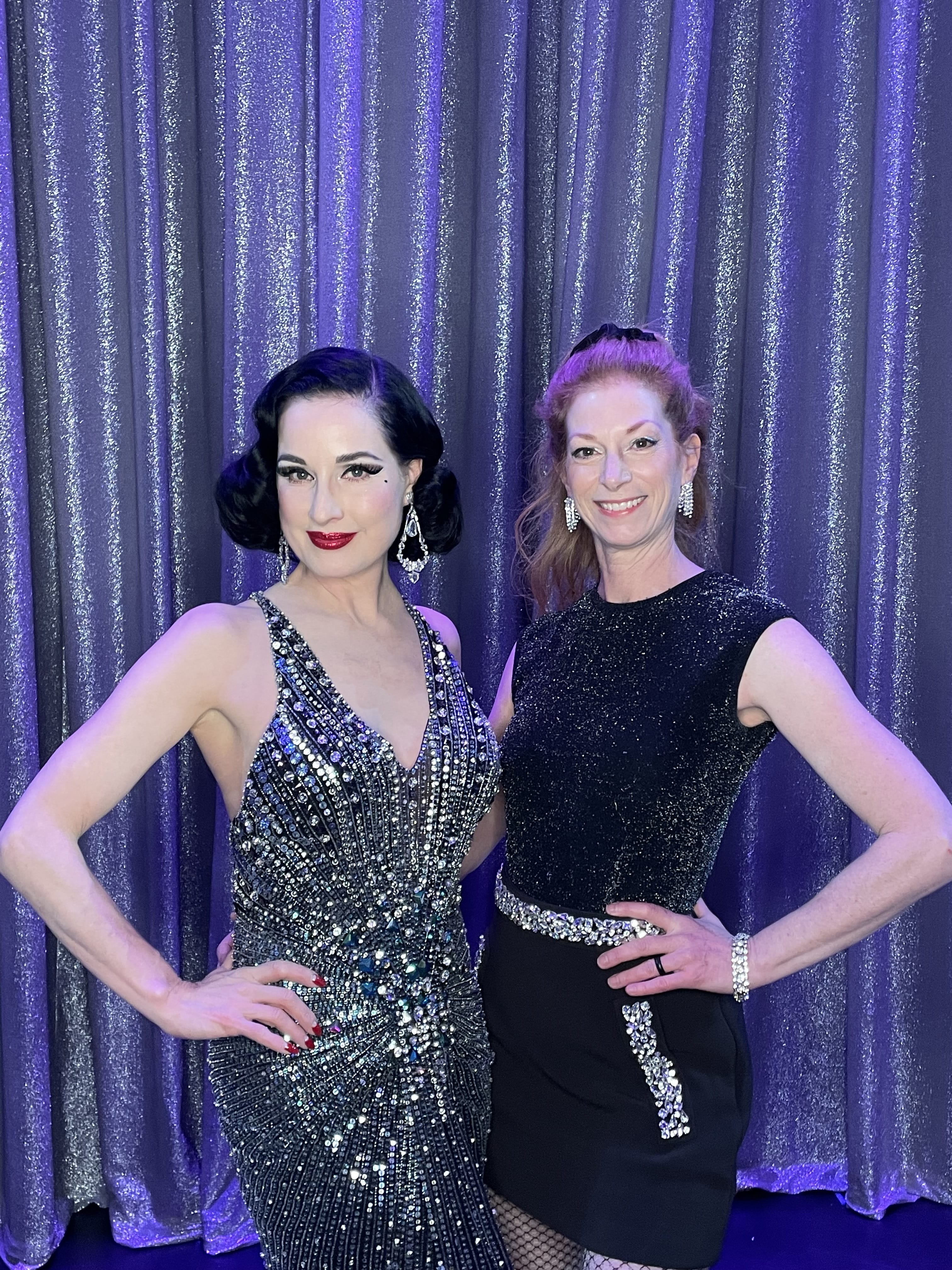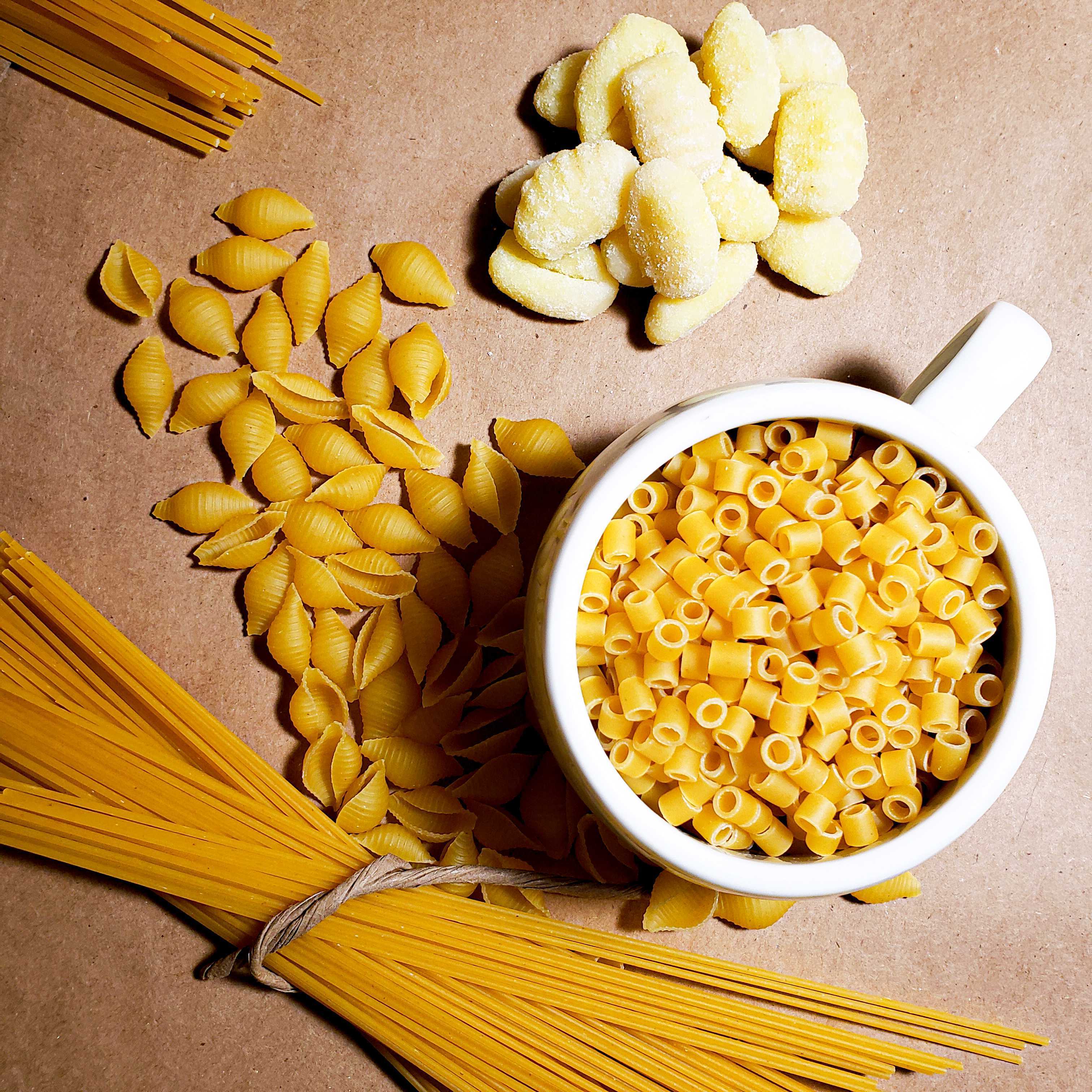Christies Co-Owner Tracey Muzzolini talks about baking, breads, and family recipes

If you live in Saskatoon, you’ve likely heard of Christies Mayfair Bakery. If you haven’t, you’re missing out on some of the best bread and pastries in Saskatchewan. Christies is a Saskatoon institution, making bread, cinnamon buns, and artisan sourdoughs for nearly a century. We had a chance to talk with one of the co-owners, Tracey Muzzolini, during a break while she was making fruit cake during the Christmas season. We talked about family recipes and what it’s like running a family business and what goes into working alongside your family for so long.
Christine: Hey thanks Tracey, for taking some time today to chat, I know it’s hectic—especially during the Christmas season.Let’s get right to it: So you just finished baking some fruit cake , and on the labels, it says that the recipe is from 1903. Does that mean it's a family recipe?
Tracey: Well, what that means is that when my dad worked at the Mac Donald Hotel in Edmonton as a pastry helper, he got this recipe from the chef that he worked for there. He still remembers the name of the chef: Walter Grieser. He used to work for this guy and this recipe came about by the Canadian national railways, you could go across Canada and they used to make it on the train, both the actual fruitcake and the bread coating. And so dad brought it over and started making it at the bakery when he came to Saskatoon. So in that respect, I guess you could call it a family recipe, but it really has Canadian historical origins, which I think is pretty cool.
Christine: So it's an old, old recipe, which leads to the next question: It started with Walter, then it was Ennio’s, and it's now been passed down to you. Does that mean you're allowed to make changes to the recipe—or is it still the same since 1903?
Tracey: Well, I'm sure I could do whatever I want, but we haven't changed it at all. I don't think my dad changed it either, but I'd have to check with him to be sure. My dad taught Trent, my husband, how to make it. So now he is also doing it exactly in the same format that my dad taught him. So it really is becoming a kind of a family recipe. But it's also an heirloom? No, not heirloom. I don't even know what the right word is, but it's pretty interesting how it's getting carried forward through different generations. We’re kind of the caretakers of it for now.
Christine: Yeah. I bet though too, that everyone helping to make can’t help but add a little bit of their personality to it. It's a super old traditional recipe, but it's kind of been refreshed by whoever's in charge of it for that year.
Tracey: Yeah. That's true, that's true. To add to that, we have these special pans at the bakery that are very old and there is a cover, basically a metal box, so the cake actually steams and bakes at the same time. It's a very classic technique. It's pretty great, actually. And they're very heavy.
Christine: So would you say that’s the style of the bakery? Traditional methods still, but adding what you've learned and also what Blair, your brother, has learned. Updating with some modern twists, but still maintaining breads in classic and traditional styles?
Tracey: Yeah. Christies as it is today is the classic definition of old meets new. We keep a lot of the old: old equipment and all the original pans and some of the original bread racks and scales. Then we modernize it with technology. Well technology and just more modern flavours, I guess you'd say.
Christine: Yeah. And I think that balance has been a success. It seems like a lot of people sacrifice one or the other. Either they’ll sacrifice the old school traditional things and be a little too modern or they'll do the opposite of that and they’ll be stuck in their ways and not adapt to changing times. But it seems like you've found a way to blend both and still make a really outstanding product.
Tracey: Yeah. Well, cause I'm a big fan of three things. I love vintage clothing, vintage furniture and just historical stuff. So a lot of that old stuff is good. So why throw it in the garbage when it's still perfectly fine and maybe, probably even better and longer lasting than some new things. And that’s what you’ll find at our bakery, a nice blend of old and new.
Gabe: So are there any other recipes that have been adapted over time or any that have still been in use over a long period of time, similar to the fruit cake
Tracey: Well, I think some of the classics, like the pan bread. And there are our farmhouse buns and cinnamon buns. The cinnamon buns have been adapted a little bit and modernized, but they are still very classic. Some of the cookie recipes are very original, some have been updated.
This year I plan to look through the old recipes and see if I can revive some other ones, just because it's fun. And people haven't seen these things in forever, like matrimonial cakes, squares or cool stuff like that. It may be that it's been away long enough that people might find it interesting again.
Christine: So with clothes, they seem to go in waves or trends. Like every five years or so, there's a new style and it’s popular for a bit, and then there's a new style that takes over. Is it the same thing with bread?
Tracey: Yeah. You know, we like to take advantage of the history that we have in the bakery. Because the bakery was opened in 1932. And I'm not exactly sure which recipes that my dad may have carried over from the Christie brothers. But I do know what my dad has done since 1965. There was a lot of cool different stuff.
So now with me, there’s a bit of a looking back and forward. I like keeping certain styles alive, but I also want to introduce new things too. Things like the artisan sourdough breads and the croissants, those were things that I brought into the bakery because it was something I was interested in. So that was something for me to find interest in and keep going and still keep some of the classic shapes and forms from classic recipes. So I was able to play to the older customers that my dad had, and at the same time hopefully interest some new customers. So that was kind of a cool evolution.
This year I'm happy that sourdough bread gained so much attention. It’s so great because I think people had an opportunity to try to make it at home, so there's more of a connection with it. And I’ve never seen sourdough so popular. When I first started making bread, it was very popular amongst the artisans. And then whole grain products have been popular in the last few years. But I’m very happy with the rise in popularity in sourdough bread, because we have a good thing going with our culture and flavor and it's just under appreciated and tasty bread.
Christine: Yeah. Well, I definitely, I can say it's definitely my favorite style of bread. You can't compare it to anything else because it's so uniquely good.
Tracey: Yeah, I like it. It's not too acidic. It's not too lactic. I feel it's just a nice balance. The sour flavor doesn't overpower the loaf. It's got some density, but still light It's got a really nice depth of flavor. It's fun to work with. It's got a nice shelf life. There’s no foreign ingredients in there. It's well cared for. It makes really good sandwiches. If you have digestive issues, the benefit of the sourdough is that it’s digested a lot of the enzymes already so your body doesn't have to do it. There are lots and lots of bonuses.
Christine: Yes for sure. On another tack: this was something that Steven from Kitako Lake discussed too, about what it's like working in a family business. So I know, you and your brother Blair own it, obviously, and then your father was the owner before that.
Tracey: And Janet. We can’t forget about my mom. She’s the brains of the operation.
Christine: Of course. I guess I’d like to get your thoughts on what it’s like having to work with family members and in a business where, I guess when you were younger and Blair too, I guess you were not only working with your family, but you're living in the same house. So what was it like having to kind of balance those two parts of your life?
Tracey: Well, I guess you could put it like I didn't really know any other way. I was born into the business. And sure it is challenging. Like when you have one idea and another person has a different idea and then you don't see eye to eye and there's no clear answer as to where to go. But for the most part, I feel lucky that we have such a supportive family to keep us going and keep us growing.
So yes, challenging, but also pretty satisfying too. And I probably would never even get to see my family if I didn't work with them. So that's pretty cool. It takes a lot of commitment and a lot of hours, having a family business. So this way we get to see each other and work together too. And then we built Il Secondo as our second location so Blair was able to take care of that location and I was able to take care of the bakery so that worked out pretty handily. It gave us a bit of a break from each other. And then Gabe, my nephew came up from California to take care of Il Secondo. Juliana, my niece, has worked for us and my cousin Beverley worked for us as well.
Christine: It really is a family business. Could you come up with the exact number of family members that worked in the bakery?
Tracey: Well okay, let’s just start counting. My cousin Max, my aunt Theresa, she was our cake decorator. My uncle Roland worked for my dad. Me and Blair. My mom and dad and my big brother Russ. My husband Trent has as well. I hope I didn’t miss anybody, but off the top of my head that’s who I can think of, how many is that? Twelve? I’ll have to think and see if anyone else comes to mind.
Christine: Yeah, even just there, that's a heck of a lot of family members.
Tracey: Oh and there’s Blair’s partner Jen, she worked for us too. And her sister Shana. And her wife, Emma. We’re up to 15 now if we’re including extended family!
Christine: That’s pretty unique in even family-run businesses - but also awesome to have all those people, not to mention all the rest of the staff all working towards one goal.
Tracey: It is. It is. We sometimes forget about that, but the bakery is quite a special place. It's a source of hardships in some ways and there is the constant daily grind. But it’s also fun and there’s family and history.
I have to say, the bakery is a tough place in a way, I don’t think people think of it like that but it's pretty tough. You need to be physically strong and tough. But it’s also very giving. It’s given a lot to myself and my family. And so I do respect it and appreciate it for what it is. It’s carried us through many times, good and bad, and all sorts of times. It keeps you humble and puts food on your table. What more could you ask for?
Christine: And to be honest, for having a business that's been around since 1932, and one that has been in your family for over 50 years. It’s pretty cool to be part of that story.
Tracey: Oh yeah. That’s for sure.
Christine: Well, like we said we're up to 15 family members that worked in the bakery. And as I think anyone that's been in a family business knows it's not always easy and it has its ups and downs. So can you tell us a brief, little story or anecdote that you kind of look back fondly on of working with a family member?
Tracey: Hmm. So many, so many.. Let me think here. Well, there's the classic childhood memories of, and I up this story a lot, because it has made an impact on my brain. When my parents first bought the bakery and I was just a wee kid, my brother and I would sleep in the front of the bakery in sleeping bags, when my mom had to come and help my dad prepare some breads or big orders. And so we would sleep in the front and then I would wake up and I could smell the bread coming out of the oven, so I would just wander over there in my pajamas. And my dad would put me on top of the big table and he'd pull out super tender white pan bread onto the table and I just cracked that thing open and ate it up right on the table. I mean, that's a pretty special memory.
Christine: That’s really cool. If you have to go to work with your parents, it’s probably more exciting to be at a bakery than it would be to be sitting with them in an office.
Tracey: Right. And you get fed at the bakery! What kid wouldn’t want fresh donuts and bread? You know, I also learned a lot about my parents. They had to do what they had to do to make the business work and I learned from that. But yeah, being in the bakery is pretty fun. Although the floor was a little hard to sleep on in those early days. But it was like camping: you have a little sleeping bag, a little pillow, it was fun. There’s more stories for sure, but that’s one of the most memorable for me.
Christine: And what about the opposite end of that? Maybe not a good memory, but one that you can look back on now and kind of laugh about and poke fun at, now that time has passed.
Tracey: Oh, okay. Yeah, let's see here. Maybe just like working with Blair, both of us having very short fuses. I thinkI remember throwing like a pound of butter at the door as he left one day. There’s been a lot of ‘cool off’ walks around the block. Whether it be dealing with my dad or my brother, just like, okay, I gotta get out of this bakery now and take a walk because it's too hot in here.
Christine: Yeah. And not just the heat coming from the oven.
Tracey: Exactly. You know, we're Italian so we have tempers. We’re passionate people. But now I look back, I think geesh, you know as you get older, you learn how to control yourself a little bit more. Kind of sad looking back, but in the moment, it was just because we all cared, and we all sorta wear our emotion on our sleeves.
Christine: Yeah. I think as long as you're able to look back and learn and grow from the moment or that situation. You can't do much about the past, but if you're able to kind of learn and grow from it, then all the better.
Tracey: Yeah. That's what we're here to do.
Christine: I guess I'll ask this question just to give some more information to the public who might not know as much: when did you and Blair take over? When did the bakery transition to you guys?
Tracey: Hmm. Well, we've both been working there since we were young kids. And then I went away for a while to go to Australia and then Toronto. And then at some point it officially passed on to us, I can't even remember if it's been 10 years now or when it actually was. Keep in mind it’s been about 20 years since we both got really actively involved in the business and started pushing changes. But the official transition was probably a decade ago. I’d have to dig out the paperwork to know exactly when. It goes by so fast.
Christine: Yeah well it's like you said, you've been working there since you were a kid, so it's like technically you’ve been there for your whole life.
Tracey: I think the evolution of the bakery with our generation started when I came back from Toronto. And so that was over 20 years ago. So that's when we started, we were working together, evolving the artisan breads, buying new equipment, changing things. So that sticks out as a kind of a significant time for me.
Christine: You said it was once you came back from that little trip, was there anything specifically that happened over that trip that made you realize that you wanted to come back?
Tracey: Well, let’s see, I went to Australia, just for holidays. And then I ended up staying there for four years.
Christine: Seems like a long holiday.
Tracey: Yeah. And then I got to experience all these diverse foods and cultures, because living in Saskatoon at the time, it wasn’t exactly involved in the food world. So that was exciting. And then working in Toronto for Suser Lee was very eye opening. And I'm working at different restaurants and it felt natural to me. So I was baking, working as a Baker in the restaurant and I was like, what the heck? What am I doing here? I got a whole bakery in Saskatoon. Why don't I just go there and do my growing and experimenting with breads? And so that's what I did.
After that I never looked back. It was something that was able to capture my attention for a long period of time because with bread there's so much to know about it. And there's so much to learn. It takes a long time to get good at it or feel comfortable with it. And then when you feel like you're comfortable with it, something happens and you’re like, crap, I don't know anything.
So that's why I say bread is like so humbling because it kicks your butt. There's still so much to learn about bread and pastry. So it’s kind of like a life purpose, I guess you'd call it.
Christine: That’s cool. Once you find your passion, it never really goes away. You're always constantly chasing it and working at it.
Tracey: Right. And then pizza - what seems like the latest trend in pizza, I guess that's 10 years already. Like wood-fired pizza and Napoletana style pizza was very exciting, and still is to me. It's the most simple, beautiful kind of bread product. I don't even know if you can call it bread.
Christine: I think you're the expert, so you can call it whatever you want to.
Tracey: Just two things that I really do enjoy working with is like shaping bread, baguettes and boules and making pizza. That's the best feeling. I don't think that'll ever change for me anyway.
Christine: That's good to hear. Because you can taste it when you're eating the bread or the pastries or the pizza or what have you. And from talking with you, and just from interactions that you see from staff that you have working for you can definitely see and feel and taste the passion. Which you would hope to get from a small family business. I think you pick up on it as a customer. You can definitely get that sense as soon as you walk in the building, You smell the fresh bread and you just feel the family aspect and then the passion that comes with it.
Tracey: Well, that's good. That's all I can hope for really. Because there's a lot of technique involved, but it takes a lot of care too. So it's very rewarding. Making bread is very rewarding, especially when people appreciate it. It’s something that’s rewarding to share.
Christine: Yeah that's true. Hey do you think you could you possibly estimate how many loaves of bread or croissants you've had to make by hand?
Tracey: Oh, no… that’s a good one. I’ll say 10,000 just to give you a number, but that’s not close and on the smaller end. When I started learning how to shape baguettes with my mentor, Didier Rosada, I was getting frustrated. He said, ‘don't worry, after you shape a thousand of these, you'll get the hang of it.’
Christine: It's like the 10,000 hours thing. Repetition, repetition, repetition.
Tracey: Yeah, exactly. I feel pretty confident in the shaping of baguettes, I can say that. That's where I meditate. My brain doesn’t need to think about it anymore.
Christine: It’s just muscle memory at this point?
Tracey: Yeah. I just feel locked in the zone. I feel good.
Christine: I mean, hopefully you're feeling good when you're working and I guess that's the whole point of it is finding something that you can work at, but then also something that does give you fulfillment and makes you feel good.
Tracey: Yeah. If I'm shaping bread, I'm feeling pretty good.
Christine: Well, I've gone through my list of questions here, so before we say goodbye was there a message you wanted to put out there?
Tracey: Let's see here. I would say this to our customers, and to people in Saskatoon, thank-you for supporting us small businesses, because we work really hard. We employ local people. And local food businesses put food on people's tables, and we do it with love. It's not just about the dollar. So thank you for the support and please continue to support small, local businesses. It means a lot to us.
Christine: That's a great message. And hopefully there is a trend of continuing to support local and it doesn't end whenever we get through this whole situation. I hope it’s now something that is a mainstay.
Tracey: Yeah, me too because it's a nice relationship and you see where your food is coming from and it could be your neighbor.
Christine: I think that’s the perfect note to end on. Thanks for taking time out of your busy schedule to talk.
Tracey: This was fun, thanks for the talk!



